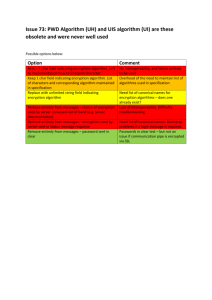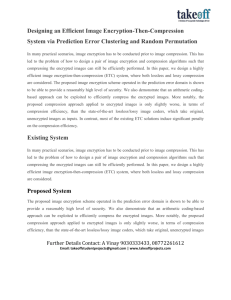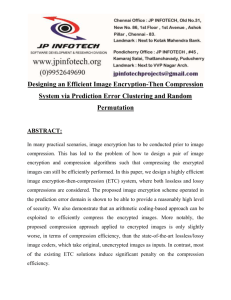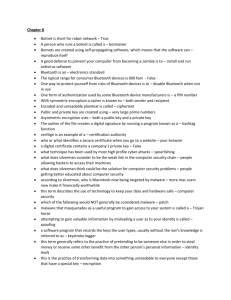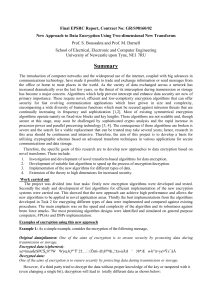Proposal presentation slides
advertisement
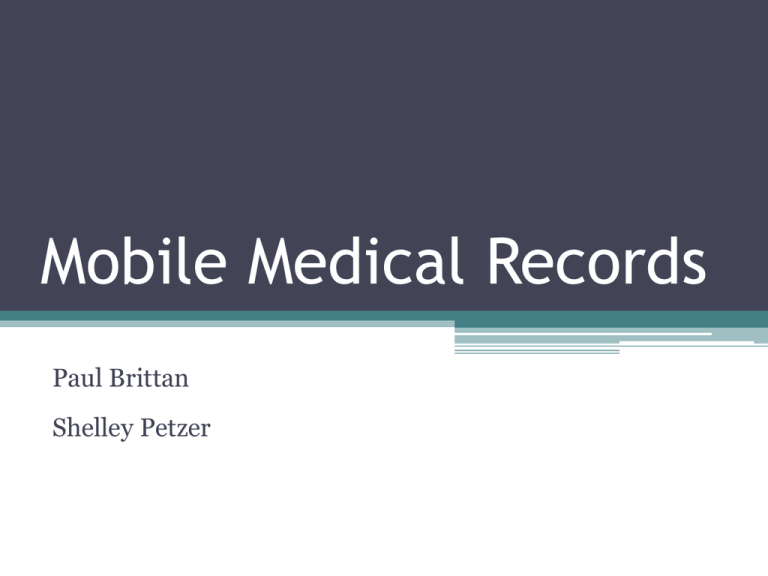
Mobile Medical Records Paul Brittan Shelley Petzer Overview • • • • • • • • • • Introduction Problem Statement Research Questions Evaluation Work Allocation Related Work Key Success Factors Risks Timeline Conclusion Introduction • Aim is to investigate the secure storage of medical records on cell phones ▫ Original idea was proposed by Simelela ▫ Provide patients with the means to securely manage their medical records • Main Focus for the project ▫ Compressing the data for storage ▫ Secure transfer & encryption of data ▫ Rudimentary interface for testing purposes Problem Statement • Designing applications in developing countries ▫ Access to more advanced technology is limited ▫ A cell phone is ideal because of its diversity • However cell phones create issues ▫ Challenges related to the limited resources ▫ Ensuring the privacy of the medical record Research Questions (Paul) • Comparison of storing medical records on the internal memory of the cell phone as opposed to a microSD card • The performance comparisons of compression algorithms ▫ Involves the analysis of several lossless compression algorithms ▫ Reducing the storage space of the medical record whilst minimising the resources used Research Questions (Shelley) • The performance comparisons of encryption algorithms ▫ Involves the analysis of several algorithms ▫ Finding an algorithm that maximises security ▫ Minimising the resources required by the cell phone • The transmission medium between the cell phone and a medical database ▫ Investigate the strengths and weaknesses of Bluetooth technology and wireless networks for transmission Evaluation • Test the performance of the encryption & compression algorithms ▫ Test algorithms on anonymised medical records ▫ Analysed according to efficiency and based on resources used • Ideally, we want comparable measurements for ▫ Execution time ▫ CPU usage ▫ Memory usage Evaluation Cont. • Research needs to be done on testing applications for mid-tier phones ▫ Performance monitors ▫ Benchmark tests • Last Resort ▫ Measure the battery power on the cell phone before and after each test Work Allocation (system) Work Allocation (testing) Ethical, professional and legal issues • Ethical issues involved with medical record data ▫ privacy ▫ Plan to use anonymised medical records • No ethics clearance is required ▫ No user testing will take place Related Work • Systems that provide electronic medical records ▫ OpenMRS • Medical records on a cell phone ▫ JavaRosa ▫ Open Data Kit clinic • Early stages of development • Privacy not a priority Anticipated outcomes • Prototype that allows the following: ▫ Storage of medical records on a cell phone ▫ Transmission of medical records between a cell phone and medical database • Encryption and compression of the medical record • Performance analysis Key success factors • Storage and transmission of the medical record ▫ Efficient ▫ Secure ▫ Compressed • Storing the medical record on the internal memory • Transmission using Bluetooth • Analysis of encryption and compression algorithms Risks • Failure to successfully measure performance • Failure to meet milestones • Hardware failure • Gathering medical record data • Group member becomes unavailable Timeline • Research and design: 15 days • Algorithm implementation and testing: 20 days • Merging components with testing: 22 days • Dedicated report writing: 20 days Conclusion • The project will contribute towards a mobile medical record framework ▫ Benefit patients and medical practitioners in medical record management • The project will attempt to cater for developing areas and consider the limitations of a cell phone Questions ? Gantt Chart Team Paul Shelley Timeline Task Number of days Initial feasibility demonstration Medical record transmission 15 days Testing transmission 5 days Medical record storage 15 days Testing storage 5 days Combine and final testing 7 days Implementation Research and Design 15 days Encryption Implementation & Testing 20 days Compression Implementation & Testing 20 days Combine Components for final prototype 10 days Final Performance Testing 5 days Final Coding and testing 7 days
